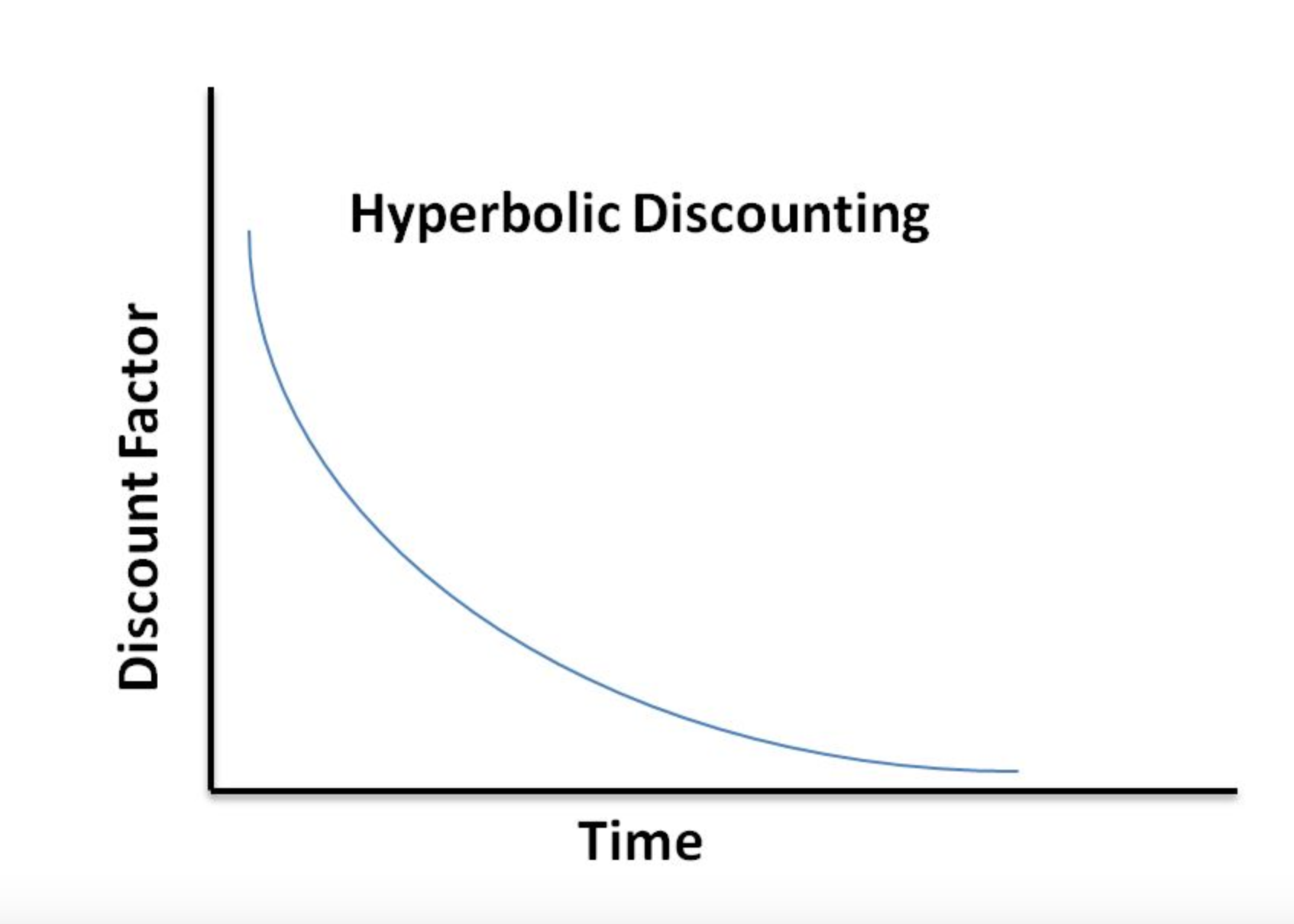As humans, we strive to be efficient and maximize personal utility. We have made tremendous strides in the service industries, incorporating technologies that have minimized wait times and maximized profits. While it has led to increases in living standards across the world, it has perpetuated a culture of consumerism and instant gratification. However, we find that the advent of these ultra-fast technologies has increased our propensity to be impulsive and reduced our tendency to be patient, both factors which when observed on the macroeconomic scale can be crippling to long-term economic prosperity.
To further understand the implications of these cultural factors on economic health, one may turn to the field of behavioral economics, or more specifically a phenomenon called Hyperbolic Discounting, which depicts an individual’s tendency to prefer smaller-sooner rewards disproportionately to larger-later ones. While much of the literature on this subject concerns the relationship between this waiting tendency and other psychological phenomena such as drug abuse and obesity, it has been shown that this inclination for impulsivity also has significant correlation with a nation’s capacity to innovate and grow. Social scientists have explored this in depth, evaluating this tendency across 53 different nations. By controlling for variables such as age, wealth and the relative state of the economy, the experiment looks at the several factors and shows that cultural perceptions are indeed among the determinants of a nation’s socio-economic wellbeing.
The study finds that ‘Long-Term Orientation’ – the cultural dimension describing one’s tendency to be forward-looking – was highest in East Asia, suggesting that individuals belonging to this region are likely to place more emphasis on the future, and exert greater will-power. To emphasize the influence of culture on this patience tendency, the paper also points to a sample of bicultural Singaporean-Americans, discovering that those who identified more strongly with Singaporean culture, compared to American culture, were less likely to pick immediate consumption over greater long-term reward.. In economic terms, this find tells us is that at each income level, those who identified more with Singapore are more likely to have a higher propensity to save than those who felt more American.
The reason why “patience” becomes an indicator of economic growth has a lot to do with the above saving mentality. The thinking follows that patience and willpower are what allow people to forgo consumption and invest in greater returns for the future. The study finds that these observations are in coherence with what we observe in reality; countries such as China have used this as the basis of their economic model for decades, something which has triggered immense growth. In comparison, growth in the United States has been much smaller in the last decades, and while this discrepancy can be attributed to many factors (such as the catch-up effect) it cannot be ignored that as a fraction of GDP, the United States’ household consumption is nearly twice that of China’s. This may suggest that increased consumption is likely to lead to less national growth.
In partaking in a consumerist culture that overvalues immediate luxuries, countries are unable to properly allocate resources for the long-term. For example, in the United States there are more shopping centers than schools, reflecting the demand for material goods relative to education. Furthemore, more is spent in the United States on fashion accessories than on university tuition, despite college education increasing lifetime earnings by approximately $1 million.
When looking at consumption relative to other macroeconomic variables, the harmful long-term effects of this culture are better understood. As a nation, the US consumes more than it produces, being one of few developed nations to do this. In order to fund this practice, it must run large deficits and borrow huge sums from foreign entities, which all must eventually be paid back. The US, even amongst the developed nations, is an exception in the sense that it can successfully run such large deficits without fearing for its economy, as a result of its worldwide influence and prestige (such as the international use of the American Dollar). However, this is not sustainable with other rising powers like Russia and China. Investors might pull out of US markets, sending the nation down an economic spiral. Due to the already exorbitant debt, this economic downturn will be very difficult to overcome.
When choosing between now and later, it is evident that Americans value the present more than those identifying with Eastern cultures. Although this article does not seek to proselytize the benefits of self-deprecation, it is standard economic theory that in changing this behavior, one is to reap great benefits in the future. Thankfully, the government is able to help facilitate this change, by altering incentives so that individuals are more likely to invest than consume. An example would be education subsidies to encourage all to pursue higher education. Even if the government is not able to alter this consumption culture, it could start by addressing the inefficiencies regarding the use of resources, such as the fact that nearly 40% of the food that is produced goes to waste, or how the average American throws out 65 pounds of clothing a year. If a way was found to re-employ rather than throw away these ‘waste’ products, the United States may be able to afford similar consumption levels with less long-term risk.
Photo: “Hyperbolic Discounting“
